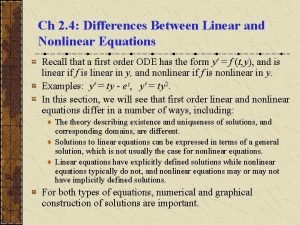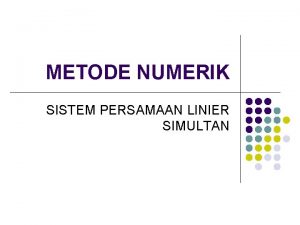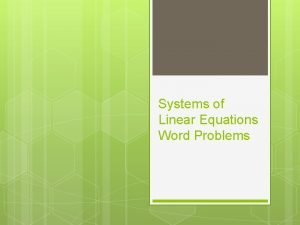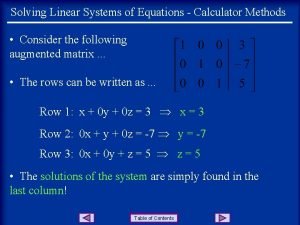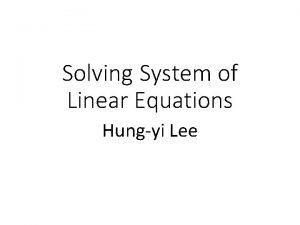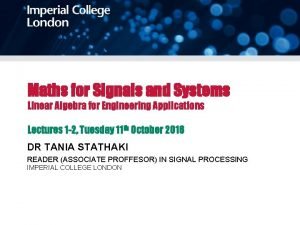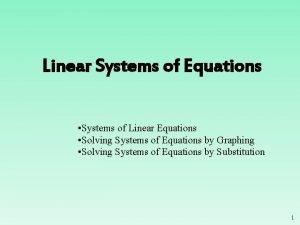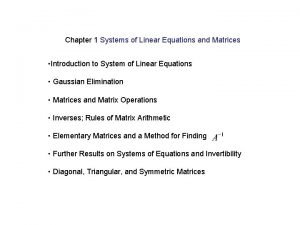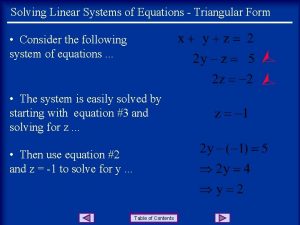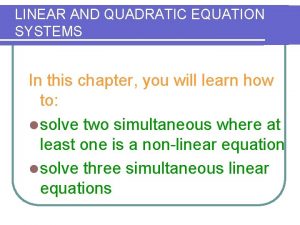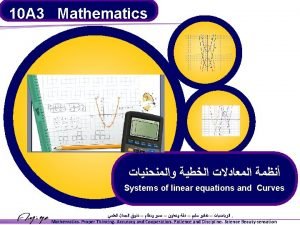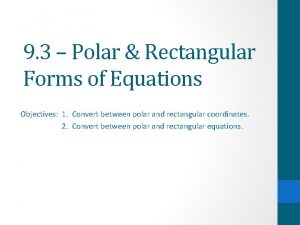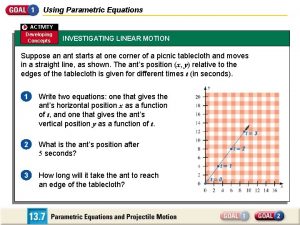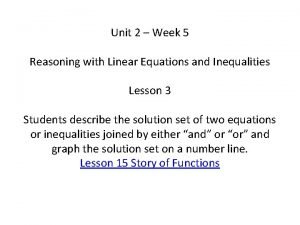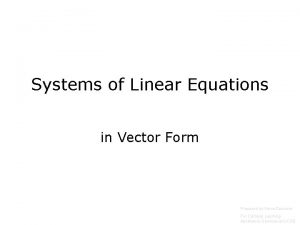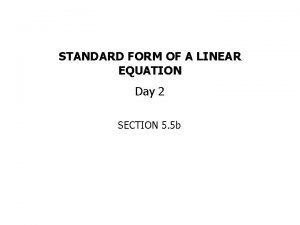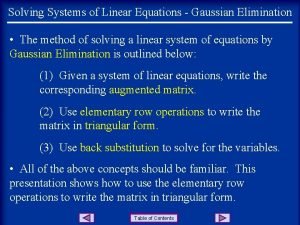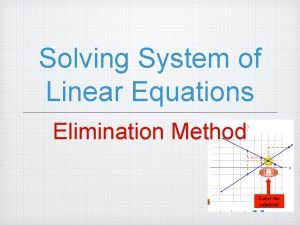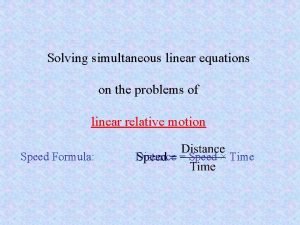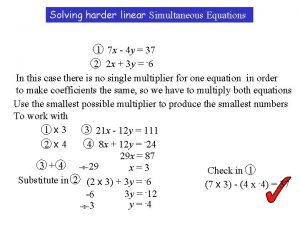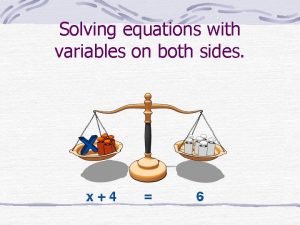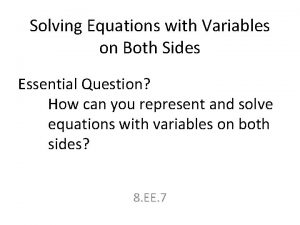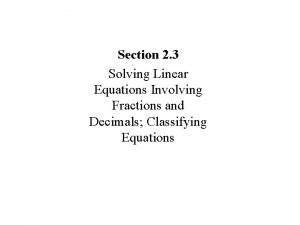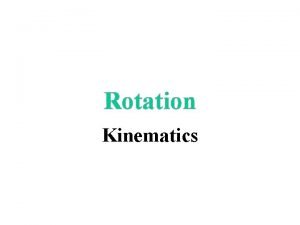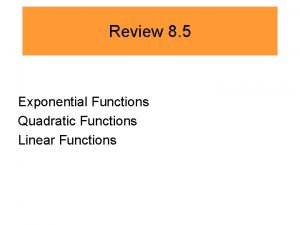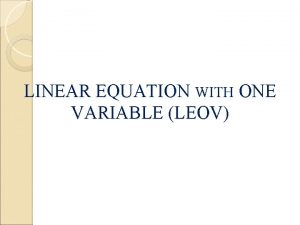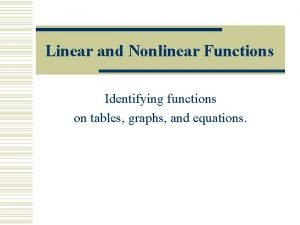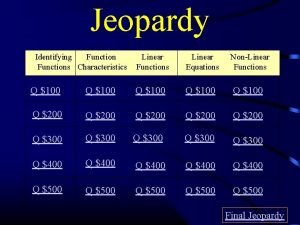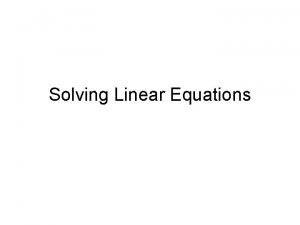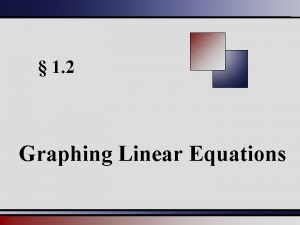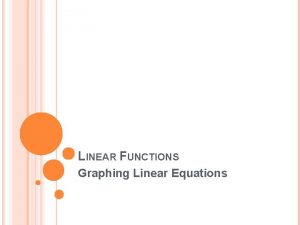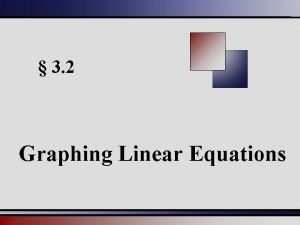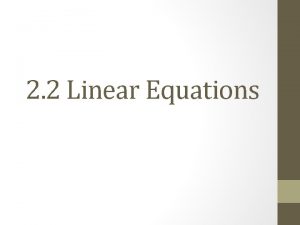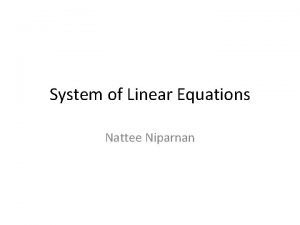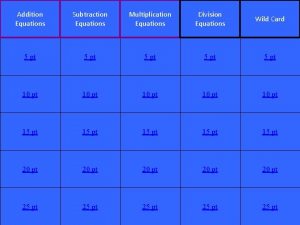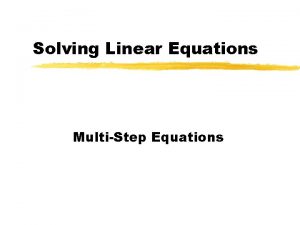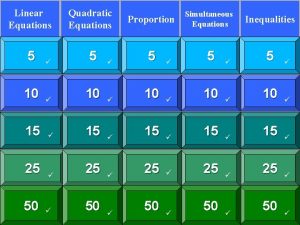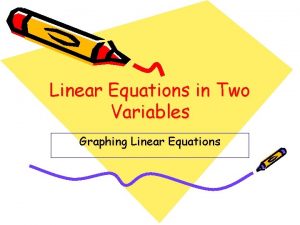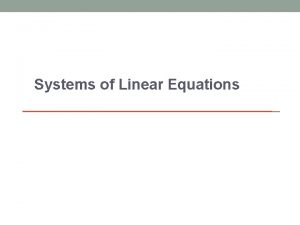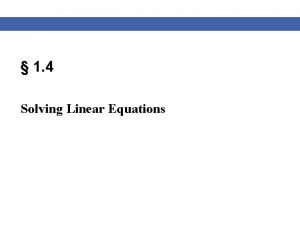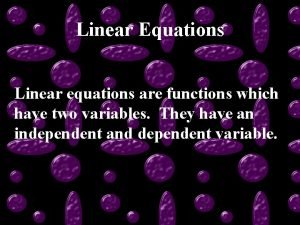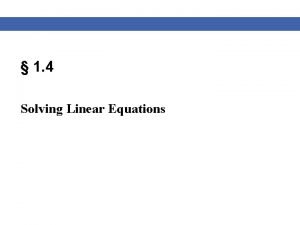System of Linear Equations System of Linear Equations




































- Slides: 36

System of Linear Equations

System of Linear Equations �Linear equation Algebraic equation Constants and unknown variables (first power) E. g. : a line can be given as: �System of linear equations A set of linear equations With the same set of variables

Jacobi Method �System of linear equation A: coefficient matrix x: variables D: diagonal matrix L: lower triangular matrix U: Upper triangular matrix

Jacobi Method �Banach fixed-point theorem The f function is a contraction f has a fixed point: Define the following sequence: Fix point

Jacobi Method �Banach fixed-point theorem The following error metrics are valid

Jacobi Method �Consequence If and converges to the solution of Spectral radius Is sufficient

Jacobi Method �Iterative solution void jakobi(){. . . int input. Buffer = 0; const int iterations = 20; for(int i = 0; i < iterations; ++i){ mul. Matrix. Vector(n, n, x[(input. Buffer + 1) % 2], A, x[input. Buffer], b); input. Buffer = (input. Buffer + 1) % 2; }. . . }

Jacobi Method �CPU implementation void mul. Matrix. Vector(int n, int m, float* y, const float* A, const float* x, const float* b){ for(int i=0; i<n; ++i){ float yi = b[i]; for(int j=0; j<m; ++j){ yi += A[i * m + j] * x[j]; } y[i] = yi; } }

Jacobi Method �Iterative solution Jakobi Jakobi Jakobi Jakobi Jakobi x: x: x: x: x: [1, 1, 1] [1. 5, 1. 5] [1. 75, 1. 75] [1. 875, 1. 875] [1. 9375, 1. 9375] [1. 96875, 1. 96875] [1. 98438, 1. 98438] [1. 99219, 1. 99219] [1. 99609, 1. 99609] [1. 99805, 1. 99805] [1. 99902, 1. 99902] [1. 99951, 1. 99951] [1. 99976, 1. 99976] [1. 99988, 1. 99988] [1. 99994, 1. 99994] [1. 99997, 1. 99997] [1. 99998, 1. 99998] [1. 99999, 1. 99999] [2, 2, 2, 2, 2]

Matrix Vector Multiplication �Parallelization Assign threads to the result elements ▪ Gather: each thread summarizes the contribution of each input element Assign threads to the input elements ▪ Scatter: each thread calculates the contribution of an input element to the output elements ▪ Synchronization needed!

Matrix Vector Multiplication �Gather The result is a vector with N elements The size of the job is N Each thread calculates one element in the result vector using one row of the matrix and the input vector Over indexing shall be checked!

Matrix Vector Multiplication �Host program void simple. MV(int n, int m, float* y, const float* A, const float* x, const float* b){ cl_kernel simple. MVKernel = create. Kernel(program, "simple. MV"); cl_mem y. GPU = cl. Create. Buffer(context, CL_MEM_WRITE_ONLY, sizeof(float)*m, NULL); cl_mem AGPU = cl. Create. Buffer(context, CL_MEM_READ_ONLY, sizeof(float)*m*n, NULL); cl. Enqueue. Write. Buffer(commands, AGPU, CL_FALSE, 0, sizeof(float)*m*n, A, 0, NULL); cl_mem x. GPU = cl. Create. Buffer(context, CL_MEM_READ_ONLY, sizeof(float) * n, NULL); cl. Enqueue. Write. Buffer(commands, x. GPU, CL_FALSE, 0, sizeof(float)*n, x, 0, NULL); cl_mem b. GPU = cl. Create. Buffer(context, CL_MEM_READ_ONLY, sizeof(float) * m, NULL); cl. Enqueue. Write. Buffer(commands, b. GPU, CL_FALSE, 0, sizeof(float)*m, b, 0, NULL); cl. Set. Kernel. Arg(simple. MVKernel, cl. Enqueue. Barrier(commands); //. . . 0, 1, 2, 3, 4, 5, sizeof(int), &n); sizeof(int), &m); sizeof(cl_mem), &y. GPU); sizeof(cl_mem), &AGPU); sizeof(cl_mem), &x. GPU); sizeof(cl_mem), &b. GPU);

Matrix Vector Multiplication �Host program //. . . size_t work. Size = m; cl. Enqueue. NDRange. Kernel(commands, simple. MVKernel, 1, NULL, &work. Size, NULL, 0, NULL); cl. Finish(commands); cl. Enqueue. Read. Buffer(commands, y. GPU, CL_TRUE, 0, sizeof(float) * m, y, 0, NULL); cl. Release. Mem. Object(y. GPU); cl. Release. Mem. Object(AGPU); cl. Release. Mem. Object(x. GPU); cl. Release. Mem. Object(b. GPU); cl. Release. Kernel(simple. MVKernel); }

Matrix Vector Multiplication �Open. CL kernel __kernel void simple. MV(const int n, const int m, __global float* y, __global float* A, __global float* x, __global float* b){ int i = get_global_id(0); if(i < n){ float yi = b[i]; for(int j = 0; j < m; ++j){ yi += A[j + i * m ] * x[j]; } y[i] = yi; } } Serial calculation!

Matrix Vector Multiplication �It is difficult to parallelize the scalar multiplication �Summation can be easily parallelized Reduction can be used Each work-group processes a column Each thread does the multiplication ▪ The results are collected in the local memory Reduction ▪ Half the number of the threads in each step ▪ The remaining threads summarizes the results of the stopped threads ▪ The last thread writes the result to the global memory

Matrix Vector Multiplication �Assumptions N*M Matrix ▪ M thread can be started in each work-group ▪ N work-group can be started ▪ The size of the local memory is M at least ▪ M=2 k for the reduction

Matrix Vector Multiplication �Host program #define M 32 void reduce. MV(int n, float* y, const float* A, const float* x, const float* b){ //. . . size_t work. Size = M * n; size_t work. Group. Size = M; CL_SAFE_CALL( cl. Enqueue. NDRange. Kernel(commands, reduce. MVKernel, 1, NULL, &work. Size, &work. Group. Size, 0, NULL) ); //. . . }

Matrix Vector Multiplication �Open. CL kernel #define M 32 __kernel void reduce. MV(const int n, __global float* y, __global float* A, __global float* x, __global float* b){ int i = get_group_id(0); int j = get_local_id(0); __local float Q[M]; Q[j] = A[i * M + j] * x[j]; for(int stride = M / 2; stride > 0; stride >>= 1){ barrier(CLK_LOCAL_MEM_FENCE); if(j + stride < M){ Q[j] += Q[j + stride]; } } if(j == 0){ y[i] = Q[0] + b[i]; } }

Matrix Vector Multiplication �A possible solution for the limitations Using one work-group for simplicity`s sake Divide the output into segments of length T ▪ The work-group process one segment at once Divide the input into segments of length Z ▪ The result of scalar multiplication calculated from the subset sums The subset sums can be stored in the local memory ▪ Local array: Q[T*Z] Reduction is used to calculate the segment of length T of the result

Matrix Vector Multiplication �Host program #define T 8 #define Z 2 void large. MV(int n, int m, float* y, const float* A, const float* x, const float* b){ //. . . size_t work. Size = T * Z; size_t work. Group. Size = T * Z; cl. Enqueue. NDRange. Kernel(commands, large. MVKernel, 1, NULL, &work. Size, &work. Group. Size, 0, NULL); //. . . }

Matrix Vector Multiplication �Open. CL kernel #define T 8 #define Z 2 __kernel void large. MV(const int n, const int m, __global float* y, __global float* A, __global float* x, __global float* b){ __local float Q[T * Z]; int t = get_local_id(0) / Z; int z = get_local_id(0) % Z; for(int i = t; i < n; i += T){ //. . . Loop body in the next slide if(z == 0){ y[i] = Q[t * Z + 0] + b[i]; } } }

Matrix Vector Multiplication �Open. CL kernel // loop Q[t * Z for(int Q[t * } body + z] = 0. 0 f; j = z; j < m; j+=Z){ Z + z] += A[j + i * m] * x[j]; for(int stride = Z / 2; stride > 0; stride >>= 1){ barrier(CLK_LOCAL_MEM_FENCE); if(z + stride < Z){ Q[t * Z + z] += Q[t * Z + z + stride]; } }

Matrix Vector Multiplication �Sparse Matrices A lot of zero elements Compression and calculations on the compressed representation �Compressed Sparse Row Value: Column: Row Ptr:

Matrix Vector Multiplication Value: Column: Row Ptr: Value + Row Ptr: Vector + Column: Element-wise multiplication: Inclusive segmented scan:

Matrix Vector Multiplication �Segmented scan Conditional scan Condition in a separated array Inclusive scan: Head array Inclusive segmented scan:

Gauss-Jordan elimination �Gaussian elimination The solution of the equation system is obtained in the form of a triangular matrix Substitution �Gauss-Jordan elimination Only the main diagonal can contain non-zero elements

Gauss-Jordan elimination �Allowed operation Change the order of the equations Multiplication by a scalar value Adding an equation, multiplied by a scalar value, to another equation

Gauss-Jordan elimination �Example

Gauss-Jordan elimination �Example

Gauss-Jordan elimination �Inverse of a matrix

Gauss-Jordan elimination �Algorithm for k : = 1. . n-1 do for i : = k+1. . n do l : = aik/akk bi : = bi – l * bk for j : = k. . n do aij : = aij – l * akj end for

Gauss-Jordan elimination �Host program void gaussian(){ int n = 6; int m = 3; float A[] = { 2, -1, 0, -1, 2, 1, 0, 0, 0, 1}; cl_kernel gaussian. Kernel = create. Kernel(program, "gaussian"); cl_mem AGPU = cl. Create. Buffer(context, CL_MEM_READ_WRITE, sizeof(float)*n*m, NULL); cl. Enqueue. Write. Buffer(commands, AGPU, CL_TRUE, 0, sizeof(float)*n*m, A, 0, NULL); cl. Set. Kernel. Arg(gaussian. Kernel, 0, sizeof(int), &n); cl. Set. Kernel. Arg(gaussian. Kernel, 1, sizeof(int), &m); cl. Set. Kernel. Arg(gaussian. Kernel, 2, sizeof(cl_mem), &AGPU); cl. Enqueue. Barrier(commands); //. . .

Gauss-Jordan elimination �Host program //. . . size_t work. Size = m; size_t work. Group. Size = m; cl. Enqueue. NDRange. Kernel(commands, gaussian. Kernel, 1, NULL, &work. Size, &work. Group. Size, 0, NULL); cl. Finish(commands); cl. Enqueue. Read. Buffer(commands, AGPU, CL_TRUE, 0, sizeof(float)*n*m, A, 0, NULL); cl. Release. Mem. Object(AGPU); cl. Release. Kernel(gaussian. Kernel); }

Gauss-Jordan elimination �Open. CL kernel __kernel void gaussian(const int n, const int m, __global float* A){ int id = get_local_id(0); for(int ma = 0; ma < m; ++ma){ float pp = A[ma + ma * n]; float coeff = A[ma + id * n] / pp; barrier(CLK_GLOBAL_MEM_FENCE); if(id != ma){ for(int na = 0; na < n; ++na){ A[na+id*n] = A[na+id*n] - coeff * A[na+n*ma]; } } barrier(CLK_GLOBAL_MEM_FENCE); } //. . .

Gauss-Jordan elimination �Open. CL kernel //. . . float coeff = A[id + id * n]; for(int na = 0; na < n; ++na){ A[na + id * n] = A[na + id * n] / coeff; } }

Gauss-Jordan elimination �Example 1, 0, 0, 1, -0, 1, 2. 23 e-08, 9. 93 e-09, 0, 1, 1. 32 e-08, 0, 2. 23 e-08, 1, 0, 0, 1, 2 3 -1 0. 75, 0. 25 0. 5, 1, 0. 5 0. 25, 0. 75
 Contoh simultan
Contoh simultan Difference between linear and nonlinear
Difference between linear and nonlinear Persamaan linier 1 variabel
Persamaan linier 1 variabel Systems of linear equations word problems
Systems of linear equations word problems Inconsistent linear equations
Inconsistent linear equations Solving equations calculator
Solving equations calculator No solution example
No solution example Properties of determinants
Properties of determinants Graph inconsistent
Graph inconsistent Chapter 1 systems of linear equations and matrices
Chapter 1 systems of linear equations and matrices The triangular system of linear equations can be solved by
The triangular system of linear equations can be solved by Systems of linear and quadratic equations
Systems of linear and quadratic equations 7:x2+(y-3√x2)2=1
7:x2+(y-3√x2)2=1 9-3 practice polar and rectangular forms of equations
9-3 practice polar and rectangular forms of equations Translate word equations to chemical equations
Translate word equations to chemical equations How to solve parametric equations
How to solve parametric equations Unit 4 linear equations
Unit 4 linear equations Reasoning with linear equations
Reasoning with linear equations Vector form
Vector form How to write equation in standard form
How to write equation in standard form Guassian elimination method
Guassian elimination method System of equations
System of equations Worksheet on simultaneous linear equations
Worksheet on simultaneous linear equations Simultaneous equations non linear
Simultaneous equations non linear Solving linear equations variables on both sides
Solving linear equations variables on both sides How do you solve multi step equations
How do you solve multi step equations Linear equations with fractions
Linear equations with fractions Angular motion equations
Angular motion equations Linear quadratic exponential
Linear quadratic exponential Systems of linear equations real world applications
Systems of linear equations real world applications Different forms of linear equations
Different forms of linear equations Solving linear equations: variable on one side
Solving linear equations: variable on one side Forming and solving linear equations worksheet
Forming and solving linear equations worksheet Learning outcomes of linear equations in one variable
Learning outcomes of linear equations in one variable Table linear function
Table linear function Core focus on linear equations
Core focus on linear equations Characteristics of linear functions
Characteristics of linear functions

